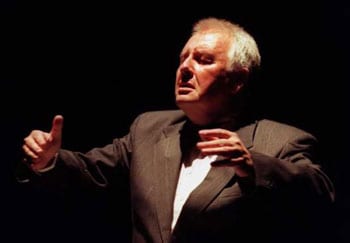
A Tribute by Marek Zebrowski, PMC Director
Source:
Polish Music Newsletter
http://www.usc.edu/dept/polish_music/news/dec10.html

The Polish MusicCenter at USC hosted this uncompromising artist for a residency in October of 1997. During this “Górecki Autumn,” his by then famousThird Symphony was performed by the Thornton Orchestra under the maestro’s baton.It was one of the most satisfying and remarkable readings delivered by a composer who wasn’t always keen to lead ensembles in performances of his works.His meetings with students and faculty left an indelible mark on the campus and was enthusiastically covered by local press. [For more about Górecki and his 1997 USC residency, please see the Polish Music Journal, Vol. 6, No. 2, Winter 2003]. Since that time, Górecki kept in touch with Polish Music Center’s founders Stefan and Wanda Wilk, who were his personal friends, and at times considered revisiting the hospitable California shores where he had been so heartily welcomed in the late 1990s. Always keenly interested in weather, in every phone conversation he would inquire about the current Los Angeles temperatures and sky conditions, bemoaning the usually the stormy and cool weather of his Polish mountaintop village location.
His slowly failing health prevented Górecki from being a prolific composer in his last decades. Although at that point he had devoted himself to chamber music and simpler forms, his unique voice was just as strong and assured as ever. During the past few years he reluctantly had to come down from his mountain to the Silesian capital of Katowice, where he had lived for many years as a young man and then as a professor at the Music Academy, and although he was again honored by the PMC at the 2009 Paderewski Lecture-Recital, the composer never made it back to sunny California. He died on November 12 after a long illness.
Ars lunga, vita brevis might be an appropriate epitaph for Górecki’s earthbound chapter.There is no doubt that, with its widely enduring spiritual appeal,Górecki’s music will always find an audience in those whodesire to reflect on the most fundamental questions the mankind has struggled to answer. Although his life was rich in accomplishment, it will always seem too short for those who wished to hear more of the music that flowed straight from his heart. In this moment of sadness we console ourselves by celebrating Górecki’s legacy, thinking of his artistic honesty, and taking an example from a life in music that is worth celebrating.
HONORING GÓRECKI IN MUSIC
On December 5, The Polish National Pantheon Foundation and Polish Music Publishers PWM hosted a special concert dedicated to the memory of the late great Polish composer Henryk Mikołaj Górecki. It was held in the St. Peter and Paul Church on Grodzka Street in Kraków. The program included the famous renaissance song by Wacław z Szamotuł, Już się zmierzcha, as well as Górecki’s string quartet of the same name, the String Quartet No. 1 op.62 (1988). Several of Górecki’s other works were also on the program: his Cantata for organ op.26 (1968) and two works for mixed unaccompanied choir, Zdrowaś bądź, Maryja! Pieśni Maryjne from op.54 (1985) and Totus Tuus op.60.
Many musicians were involved in the performance: the Kraków Filharmonic Choir, the Polish Radio Choir in Kraków, the Choir if the Kraków Music Academy, the Choir if the Papal University Jan Paweł II PSALMODIA, Kwartet DAFÔ, Arkadiusz Bialic (organist), Krzysztof Globisz (speaker ) and several conductors: Teresa Majka-Pacanek, Włodzimierz Siedlik, Artur Sędzielarz, Maciej Tworek, and Stanisław Krawczyński.
The concert was open to residents of Kraków and Małopolska, and broadcast on Polish Radio.
On December 6, Górecki—one of greatest composers in the history of Polish music and the world—would have turned 77 years old. On the occasion of the artist’s birth Polskie Nagrania has reissued the premiere recording of his greatest works – his Symphony No. 3 „Symphony of Sorrowful Songs” for soprano and orchestra, Op. 36. The new release will appear on the market December 14, 2010.
The recording was first made in May 1978 with soprano Stefania Woytowicz and the Polish Radio and Television Symphony Orchestra, conducted by Jerzy Katlewicz. The CD was first issued by Polskie Nagrania in 1993 (PNCD 215).
http://www.usc.edu/dept/polish_music/news/dec10.html
